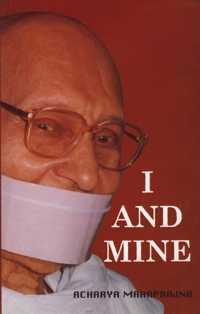
| Jainendra: | How is unity possible in a situation where the duality of the contemplator and the contemplated is not there? What kind of a state is it where the soul gets united with the soul or becomes one with the soul. |
| Muni Shree: | The soul uniting with the soul is a dualistic state. That which unites is the external state; that with which is united is the internal state. |
| Jainendra: | I sense danger in concentration. It has to eschew the danger of self-love. A little concentration beneficial for health and useful for rendering service to others, which is called self-gratification |
| Muni Shree: | Duality and unity are similar processes. At one place there is unity of God and the devotee, and at another there is unity of two states of soul. If a support is needed, it is available in both cases. |
| Jainendra: | One who gets 'fixed' in the self itself becomes in course of time not only useless but distracted. He becomes unaware of circumstances. |
| Muni Shree: | It is not a question of being 'fixed' in the self in relation' to circumstances. Faith in one's self |
| Jainendra: | It is not in the nature of consciousness to contract and limit itself. Consciousness does not return inwards from outside; it become colossal after having spread outside. |
| Muni Shree: | Consciousness getting inwards does not imply its contraction but its extension. You are using the language of territorial extension and I am using that of power extension. In territorial terms the size is also colossal. The colossal nature of consciousness is of a very exceptional kind. |
| Jainendra: | You say, 'Put an end to imagination,' whereas I say, 'Free imagination of all restrains'. |
| Muni Shree: | At certain levels of practising spiritual accomplishment your language may be acceptable. However, levels differ from person to person. |
| Jainendra: | Greater disintegration has taken place among those trying to get rid of imagination, according to my experience. |
| Muni Shree: | 'Union' |
| Muni Shree: | So far as I am concerned, earlier also I said 'contact with the self and 'no contact with the other.' The former is union. I did not speak only of separating or extricating. |
| Mohan (to Jainendra): | One can understand the language, which demands progressive renunciation, but it is difficult to understand the language, which demands progressive extension. What does it mean in practice? |
| Jainendra: | If you have reverential faith in Acharya Tulsi, it is easy to become one with him. But it is difficult to understand how Jainendra should become one with Jainendra. To unite with others is extension and it is easy too. |
| Muni Shree: | Being one with oneself and being one with someone else is a linguistic difference. Language is not truth. Truth is to be sought in truth. |
| Jainendra: | Religion turns into irreligion if one practises accomplishment of the self in place of accomplishment of the soul. |
| Muni Shree: | The same word has two forms. If 'self' implies egoism it can be irreligion, but how can it be termed irreligion if it implies existence? |
 Acharya Mahaprajna
Acharya Mahaprajna






